|
August 6th marks the 67th anniversary of the destruction of the city of Hiroshima, Japan with the first use of an atomic weapon. Thinking men and women should spend some time investigating the back story of this event and its role in shaping the world as we know it.  The Making of the Atomic Bomb Richard Rhodes (Simon & Schuster, 1986) This is the definitive work on the subject. Yes, it's long (over 800 pages) and not an easy read, but Rhodes writes in a gripping style and delivers facinating psychological insights into the personalities of the men behind the Manhattan Project. Rhodes covers it all: the theoretical origins of the bomb in the mind of Leo Szilard, the lab experiments spearheaded by Enrico Fermi and his crew of scientists at the University of Chicago, the building of the prototype, the test at Alamagordo, New Mexico, the training of the B-29 crews assigned to deliver the first two bombs and the missions themselves. He also delves into the struggle in Nazi Germany and Imperial Japan to make the first bomb, as well as the political and military events that led to the destruction of the Japanese cities of Hiroshima and Nagasaki. Well worth the time and effort.  Pandora's Keepers: nine men and the atomic bomb Brian VanDeMark (Little, Brown, 2003) VanDeMark puts his focus on the nine men who built the atomic bomb and how each struggled with the implications of their deadly creation. He does an excellent job of bringing these brilliant scientists to life in this examination of the moral ambiguity that exists in "an imperfect world that sometimes forges good from evil and evil from good." First, we witness science at work, in the act of creation that drove these talented individuals. However, then VanDeMark switches gears and tackles the issues of the aftermath, when the scientists, academics all, realized the real-world horrors and implications for the future that their creation had wrought. Pandora indeed. 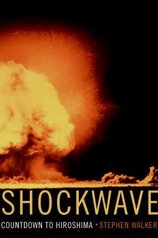 Shockwave: countdown to Hiroshima Stephen Walker (Harper Collins, 2005) This high-speed rollercoaster ride of a narrative recreates a (literally) minute-by-minute retelling of the Hiroshima bombing as remembered by American soldiers, Los Alamos scientists, and Japanese survivors. He examines the doubts and fears of the bomb's designers, the thought processes behind the selection of the targets, and the bewilderment of citizens of Hiroshima, who were victims not only of the U.S. bomb, but a Japanese government controlled by men who were determined to continue the fight at all costs.
2 Comments
"Those who expect to reap the blessings of freedom must...undergo the fatigue of supporting it." --Thomas Paine: The American Crisis, No. 4, 1777 On this Memorial Day, I am thankful that the closest I have ever come to experiencing life in a war zone is by reading about it or listening to the oral histories of World War II and Vietnam veterans. And so a list of books, including straightforward nonfiction and memoir, that can begin to make that which is incomprehensible -- the personal experience of war -- understandable. 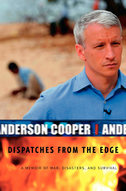 Dispatches From The Edge Anderson Cooper (2007) The correspondent and anchor for CNN recounts events from his life and career, offering a behind-the-scenes look at some of the most devastating modern tragedies (in Burma, Vietnam, and Somalia) and their effect on his own life. 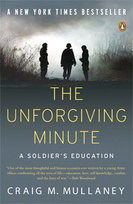 The Unforgiving Minutes: a soldier's education Craig Mullaney (2009) From a blue-collar upbringing, Mullaney rose to graduate from West Point, became a Rhodes scholar, and then an Army Ranger. He takes an unflinching look at the ways in which his extensive military education did and did not prepare him for his experiences in Afghanistan, and how those experiences shaped his views, and his later work as a Naval Academy instructor. 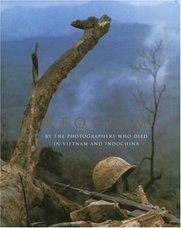 Requiem: by the photographers who died in Vietnam and Indochina (1997) A photographic essay that takes readers on an emotional journey into the wars in Indochina, Cambodia, Vietnam, and Laos. Divided into five sections, the book begins with the early notions of the wars, continues through the escalation, and ends with the final days of the conflicts. Essays are included on some of the photographers, providing readers with a glimpse into the lives of these brave men and women. The photographers' accounts of the fighting provided to various news wires are also included, but the photographs are so poignant and moving that they virtually tell the stories on their own.  The Forever War Dexter Filkins (2008) The New York Times correspondent provides a firsthand account of the battle against Islamic fundamentalism, from the rise of the Taliban in the 1990s, to the terrorist attacks of 9/11, to the wars in Afghanistan and Iraq, offering a study of the people involved from all sides of the conflict. 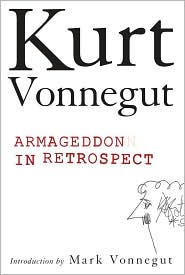 Armageddon in Retrospect Kurt Vonnegut (2008) Twelve previously unpublished writings on war and peace include such pieces as an essay on the destruction of Dresden, a story about the first-meal fantasies of three soldiers, and a meditation on the impossibility of shielding children from the temptations of violence. 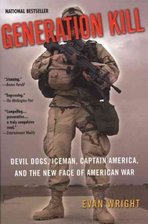 Generation Kill: Devil Dogs, Iceman, Captain America, and the new face of American war Evan Wright (2004) Wright rode into Iraq on March 20, 2003, with a platoon of First Reconnaissance Battalion Marines—the Marine Corps' special operations unit whose motto is "Swift, Silent, Deadly." He writes a gripping narrative on the lives of these twenty-three soldiers who led the attack, describing their training and the physical and psychological challenges they faced in skirmishes leading to the fall of Baghdad. 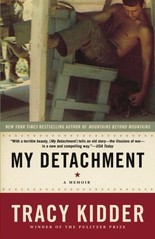 My Detachment Tracy Kidder (2005) Pulitzer Prize winner Kidder (The Soul of a New Machine) uses his gift for narrative nonfiction in this memoir of his year in Vietnam as a young army officer. This isn't a blood-and-guts thriller, but a story of painful self-revelation and amusing coming of age. He joined the ROTC as a confused Harvard student and ended up in a not very dangerous corner of Vietnam monitoring radio patterns. His attempts to command his detachment of bored enlisted men and his letters home, laced with fictional heroics, could have been the stuff of melodrama, but Kidder's storytelling and humor rise above. His account is an introspective, demythologizing dose of reality seen through the eyes of a perceptive, though immature, army intelligence lieutenant at a rear-area base camp. War isn't hell here; it's "an abstraction, dots on a map." |
AuthorTo find out more about me, click on the Not Your Average Jo tab. Archives
February 2024
Categories
All
|
 RSS Feed
RSS Feed